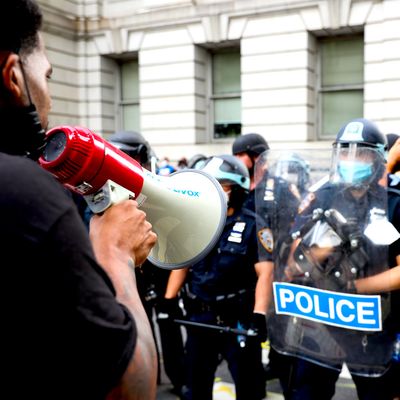
On Tuesday, as the country enters the second month of sustained nationwide protests against police brutality, a collection of organizations under the Movement for Black Lives umbrella introduced a sweeping bill to radically transform the criminal-justice system. The BREATHE Act, as it’s named, calls for a “time-bound plan” to close all federal prisons and immigration detention centers. It would also abolish ICE and the Drug Enforcement Administration, ban police departments from using surveillance and military-grade weapons, and reallocate funds from policing and incarceration to social-welfare, health-care, education, and environmental programs. Those are just a few of its components.
Though the BREATHE Act would undoubtedly face huge obstacles if introduced in Congress, organizers say its boldness is their strategy: They’re capitalizing on unprecedented momentum from protests and a discernible shift in public opinion to push real material change at the level of the federal government. “We crafted this bill to be big,” Gina Clayton Johnson, one of its creators and the executive director of Essie Justice Group, said during a livestreamed announcement event, “because we know the solution has to be as big as the 400-year-old problem itself.” The policy-makers view it as a modern-day Civil Rights Act, one that not only touches on the horrifying plague of murders of Black men and women by police officers but also holistically tackles all the elements of our broken social-welfare systems that inform it. It is a piece of legislation that, even if pie-in-the-sky, lays out a detailed, thoughtful prescription of ideas as they would be realistically implemented that have long been deemed impossible.
Representatives Rashida Tlaib and Ayanna Pressley say they support the bill, though no member of Congress has officially said they will introduce the BREATHE Act yet. Here’s what you should know:
Who helped create the BREATHE Act?
The Movement for Black Lives, a group of more than 150 organizations founded in 2014, introduced the bill, the culmination of a project by its policy table. M4BL describes itself as abolitionist rather than reformist in practice; its website says that “prisons, police and all other institutions that inflict violence on Black people must be abolished and replaced by institutions that value and affirm the flourishing of Black lives.”
What are the BREATHE Act’s most significant proposals?
No text of the actual bill has yet been released, but the summary of the BREATHE Act lays out demands to create a “time-bound plan” to totally dismantle federal policing and incarceration and to divest funds from those entities on the state level. So in addition to far-reaching, transformative demands on the federal level — the aforementioned plans to close all federal prisons, as well as youth detention and border detention centers, to eliminate federal policing agencies like ICE and to end the harshest policies like mandatory minimum sentencing and civil-asset forfeiture — the bill would abolish programs like the Department of Defense’s 1033 Program, which allows local law enforcement to obtain excess military equipment from the government. It would have the government take back equipment that was previously purchased through a Neighborhood Demilitarization Program.
The rest of the BREATHE Act is dedicated to reallocating funds saved from closed prisons and a greatly shrunken police force to community and social programs — to more equitable public housing, Medicaid expansion, and pilot programs for universal basic income and universal child care, paid for in part through federal grants. It would pass H.R.40, which establishes a congressional committee to study how the government might give reparations to the descendants of enslaved people. And it would grant all formerly incarcerated people the right to vote in federal elections, with currently incarcerated and undocumented people getting the right to vote in local and state jurisdictions.
Can these things really happen?
The BREATHE Act would encounter gargantuan resistance in Congress if it were to be introduced in full: No Democrat on the House Judiciary Committee has claimed to support calls to defund the police. But organizers are counting on a dramatic shift in public opinion, one they say “has changed the conditions of what is possible,” as author Jessica Byrd puts it. They are aiming for what they want, rather than what they think they can get. It is remarkable even to see concepts like the expunging of juvenile records and low-level drug offenses and the banning of life sentences presented as concrete policy proposals instead of wishful thinking. The BREATHE Act is a rebuke to those critics who would say “defunding the police” is a protest chant and not a set of real policy goals.
University of Michigan professor Heather Ann Thompson told the Associated Press that the BREATHE Act’s elements “only look radical if we really ignore the fact that there has been tremendous pressure to meaningfully reform this criminal-justice system. Every radical piece of legislation that we’ve ever passed in this country, it has passed on the heels of the kinds of grassroots protests that we saw on the streets. The will of the people indicates that if they just keep putting a Band-Aid on it, these protests are not going to go away.”





